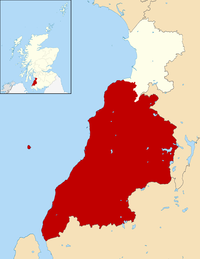From Wikipedia, the free encyclopedia
Parliamentary constituency in the United Kingdom, 1801–1868
Ayrshire was a county constituency of the House of Commons of the Parliament of Great Britain from 1708 to 1800 and of the House of Commons of the Parliament of the United Kingdom from 1801 until 1868, when it was divided into North Ayrshire and South Ayrshire.
It elected one Member of Parliament (MP), using the first-past-the-post voting system.
Creation[edit]
The British parliamentary constituency was created in 1708 following the Acts of Union 1707 and replaced the former Parliament of Scotland shire constituency of Ayrshire.
Boundaries[edit]
The Ayrshire constituency represented the county of Ayrshire, minus the parliamentary burghs of Ayr and Irvine, which were components of the Ayr Burghs constituency.
History[edit]
The constituency elected one Member of Parliament (MP) by the first past the post system until it was divided into North Ayrshire and South Ayrshire for the 1868 general election.[1]
[2]
[3]
[4]
[5]
Members of Parliament[edit]
Election results[edit]
Elections in the 1830s[edit]
Oswald's resignation caused a by-election.
Dunlop's death caused a by-election.
Elections in the 1840s[edit]
Carr-Boyle succeeded to the peerage, becoming 5th Earl of Glasgow and causing a by-election.
Elections in the 1850s[edit]
Blair's death caused a by-election.
Crichton-Stuart's death caused a by-election.
Elections in the 1860s[edit]
References[edit]
- ^ "Ayrshire". History of Parliament Online (1690-1715). Retrieved 27 March 2019.
- ^ "Ayrshire". History of Parliament Online (1715-1754). Retrieved 27 March 2019.
- ^ "Ayrshire". History of Parliament Online (1754-1790). Retrieved 27 March 2019.
- ^ "Ayrshire". History of Parliament Online (1790-1820). Retrieved 27 March 2019.
- ^ "Ayrshire". History of Parliament Online (1820-1832). Retrieved 27 March 2019.
- ^ Jenkins, Terry. "MONTGOMERIE, James (1755-1829), of Wrighthill, Ayr". The History of Parliament. Retrieved 7 May 2020.
- ^ a b c d e f g h i j Smith, Henry Stooks (1842). The Register of Parliamentary Contested Elections (Second ed.). Simpkin, Marshall & Company. p. 196. Retrieved 5 September 2018.
- ^ Churton, Edward (1838). The Assembled Commons or Parliamentary Biographer. p. 78. Retrieved 17 August 2019 – via Google Books.
- ^ "Leicester Herald". 11 July 1835. p. 5. Retrieved 17 August 2019 – via British Newspaper Archive.
- ^ Smith, Henry Stooks (1841). The Register of Parliamentary Contested Elections (Second ed.). Simpkin, Marshall & Company. pp. 196–197. Retrieved 1 September 2018 – via Google Books.
- ^ Churton, Edward (1836). The Assembled Commons or Parliamentary Biographer: 1836. p. 216. Retrieved 1 September 2018 – via Google Books.
- ^ "Election Prospects". Morning Post. 22 June 1841. pp. 3–4. Retrieved 1 September 2018 – via British Newspaper Archive.
- ^ a b Jenkins, Terry. "Ayrshire". The History of Parliament. Retrieved 7 May 2020.
- ^ a b c d e f g h i j k l m n Craig, F. W. S., ed. (1977). British Parliamentary Election Results 1832-1885 (e-book) (1st ed.). London: Macmillan Press. ISBN 978-1-349-02349-3.
- ^ "Ayrshire Election". Yorkshire Gazette. p. 5. Retrieved 7 May 2020 – via British Newspaper Archive.
- ^ "Polls on Wednesday". Greenock Advertiser. 10 July 1852. p. 2. Retrieved 5 September 2018 – via British Newspaper Archive.
- ^ "Ayrshire County Election". Glasgow Herald. 27 October 1859. p. 2. Retrieved 5 September 2018 – via British Newspaper Archive.
See also[edit]
|
|---|
|
|
- Aberdeen North
- Aberdeen South
- Airdrie & Shotts
- Angus
- Argyll & Bute
- Ayr, Carrick & Cumnock
- Banff & Buchan
- Berwickshire, Roxburgh & Selkirk
- Caithness, Sutherland & Easter Ross
- Central Ayrshire
- Coatbridge, Chryston & Bellshill
- Cumbernauld, Kilsyth & Kirkintilloch East
- Dumfries & Galloway
- Dumfriesshire, Clydesdale & Tweeddale
- Dundee East
- Dundee West
- Dunfermline & West Fife
- East Dunbartonshire
- East Kilbride, Strathaven & Lesmahagow
- East Lothian
- East Renfrewshire
- Edinburgh East
- Edinburgh North & Leith
- Edinburgh South
- Edinburgh South West
- Edinburgh West
- Falkirk
- Glasgow Central
- Glasgow East
- Glasgow North
- Glasgow North East
- Glasgow North West
- Glasgow South
- Glasgow South West
- Glenrothes
- Gordon
- Inverclyde
- Inverness, Nairn, Badenoch & Strathspey
- Kilmarnock & Loudoun
- Kirkcaldy & Cowdenbeath
- Lanark & Hamilton East
- Linlithgow & East Falkirk
- Livingston
- Midlothian
- Moray
- Motherwell & Wishaw
- Na h-Eileanan an Iar
- North Ayrshire & Arran
- North East Fife
- Ochil & South Perthshire
- Orkney & Shetland
- Paisley & Renfrewshire North
- Paisley & Renfrewshire South
- Perth & North Perthshire
- Ross, Skye & Lochaber
- Rutherglen & Hamilton West
- Stirling
- West Aberdeenshire & Kincardine
- West Dunbartonshire
|
|
|---|
| Settlements | | |
|---|
| Administration | |
|---|
| Culture | |
|---|
| Geography | |
|---|
| History | |
|---|
| Sport | |
|---|
| Transport | |
|---|

